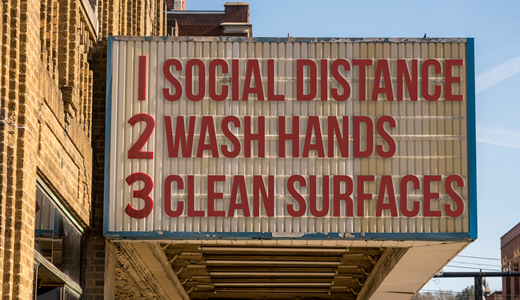Long, long ago—back in March, I think it was—every Monday we would typically recap the biggest, most lucrative movies playing in theaters over the weekend. The biggest of the big might clear $100 million or more in a weekend. But sometimes the theater turnstiles would turn a little slower. Back on Feb. 24, we reported that Sonic the Hedgehog won its second-straight weekend with a mere $26.2 million.
Ah, the good old days.
Technically, box-office tabulators are still working … but they have a lot less work these days. Indeed, they’re apparently sleeping in a bit. The latest numbers we’re getting from Box Office Mojo as we were publishing are from last weekend, not this one. And even so, our usual top rundown is, well, three movies short. Only two movies were playing “in theaters,” according to Box Office Mojo: The True History of the Kelly Gang earned a grand total of $9,839 from five of them. Resistance—a much better movie than Kelly Gang, by the way—collected $2,223 from one. And … yep, that’s it.
Whole movies are making less in a week than a good orthodontist does.
Both of those flicks, and plenty of others, are getting some traction with video-on-demand rentals. But unless a studio wants to show us how much a given movie made via streaming rentals (as happened with Trolls World Tour), we’re not necessarily gonna know how much it made.
As a result, websites that report box-office returns have resorted to some interesting gimmicks. For instance, Slate offered a box-office report from 1922—the very first year that Variety started to track such things. (The Isle of Zorda was the big news, it seems. Charging 35 cents a ticket, and 25 cents for matinees, Zorda banked $7,000 at Clune’s theater in Los Angeles.)
But sometime soon, we might have some real numbers to report again.
Not big numbers, mind you. But some Texas theaters owned by EVO Entertainment are preparing to open today—albeit under pretty strict conditions. Guests will be subject to an infrared temperature screening and sent home anyone measuring 100.4 degrees or more, and the theaters themselves will only be allowed to hold 25% of their typical occupancy. (That could increase to 50% capacity if all goes well.)
Other big chains, though, are electing to stay closed in Texas for now—even as the National Association of Theater Owners is projecting a $4 billion loss this year. The same could be said in Georgia. Even though Governor Brian Kemp gave the greenlight for theaters to reopen April 27, few, if any, did.
“We are not going to open on Monday, and we don’t have any plans as to when we would,” Brandt Gully, owner of the Atlanta-area Springs Cinema & Taphouse, told Variety. “Even if we wanted to, we wouldn’t be ready. It just doesn’t feel socially responsible to me to go out there to try to grab a few bucks.”
Even if theaters wanted to reopen, they don’t have many movies to show. All of the big movies planned for the spring and early summer have been pushed off. The Purge 5 will be heading for theaters July 10, if all goes well. But Christopher Nolan’s Tenant is the first real tentpole movie that’s still on target for its scheduled release date, and that won’t hit until July 17.
Many theaters say that that’s about the time they’ll start propping open their doors again.
“We will open a few weeks before then with repertory films to build some momentum ahead of Tenant,” said Bo Chambliss, president of the Georgia Theater Company, in a recent statement. “We believe there is a lot of pent-up demand for movie-going and expect people want to get out of their houses to see a movie as soon as they can. Business will be back to usual before we know it.”
Still, some say it’ll be a while before many will feel comfortable going to movies again. And there are those who say that not all theaters will be around if and when they are.
Says theater lobbyist John Fithian to the Los Angeles Times, “Whatever the definition of a distressed industry is, we definitely qualify.”






Recent Comments